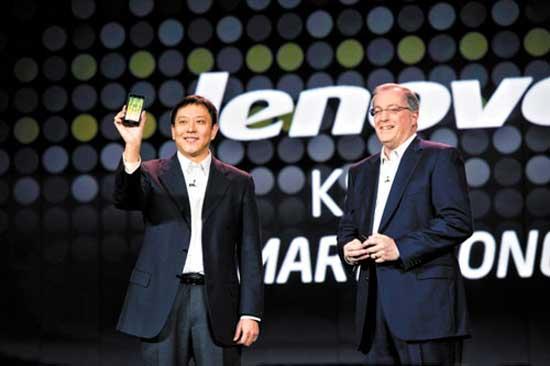| Videos | ? Latest |
|
? Feature | ? Sports | ? Your Videos |
Lenovo to launch first smartphone with Intel chip

 0 Comment(s)
0 Comment(s) Print
Print E-mail CNTV, April 12, 2012
E-mail CNTV, April 12, 2012
Technology companies around the world are trying to catch up to Apple and Samsung in the booming smartphone market. Intel is now inside that competition. The world's leading chip maker is teaming up with Chinese computer giant Lenovo to produce the first smart phone with an Intel processor inside.
 |
|
Standing next to Paul Otellini (right), president and chief executive officer of Intel Corp, Liu Jun, senior vice-president of Lenovo Group Ltd, holds a Lenovo K800, the first smartphone powered by Intel chips, during the Intel presentation at the 2012 International Consumer Electronics Show in Las Vegas. |
It was showcased on Wednesday at the 2012 Intel Development Forum in Beijing.
Chip maker behemoth Intel has so far sat out the smartphone and tablet race.
But now, Intel will be inside Lenovo's latest smartphone, the LePhone K800.
The new model is powered by Intel's "Medfield" processor and equipped with 32 nanometer technology. Intel says the new processor will carry on its advantages in calculating while offering better battery efficiency, as well as a fast and smooth user experience.
Lenovo says the smart phone will hit the market this May. It'll use Intel's Medfield and run on the Android operating system.
Besides Lenovo, Intel is working with 10 undisclosed Chinese and global vendors to design Window 8 tablets using the companies chips according to Sean Maloney, Chairman of Intel China.
Mr. Maloney said that Intel's strategy in China now is to win with smartphone and tablets. But that hefty goal comes with a fair share of challenges. Intel's collaborator, Lenovo's, share of China's smartphone market last year was less than five percent, according to research firm Canalys. Moreover, the nation's smartphone market is already dominated by tablet and smartphone chips from rival Nvidia, Qualcomm and Samsung.
Many analysts believe Intel's move into the smartphone and tablet markets was prompted by sluggish sales of traditional PCs last year.
But Intel believes the PC industry itself is transforming.
Intel says 75 models of its new conceptional ultrabook designs are on the way. By putting forward the ultrabook concept last May, Intel aims to create new laptops that are not only thin and light, but also feature long battery life and quick turn-on times on par with tablets.





